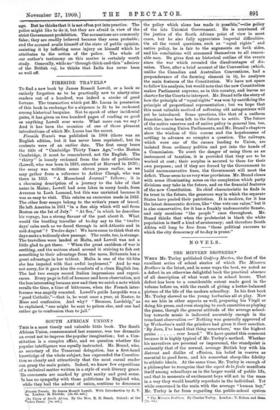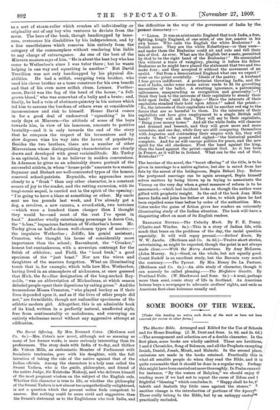NOVELS.
THE MINVERN BROTHERS.*
WHEN Mr. Turley published Godfrey Marten, the first of the excellent series of school stories of which The Arinvern Brothers is the latest, and in some ways the best, we noted as a defect in an otherwise delightful book the practical absence of all description of what went on in school hours. That defect has been to a considerable extent made good in the volume before us, with the result of giving a better-balanced picture of the life of the modern schoolboy. In his first book Mr. Turley showed us the young barbarian all at play. Now we see him in other aspects as well, preparing his Virgil or doing his prose, and even stooping to such amenities as playing the piano, though the general attitude of the average school- boy towards music is indicated accurately enough in the trenchant observation :—" Nothing was generally approved of by Wetherbee's until the grinders had given it their sanction.
By Jove, I've heard that thing somewhere,' was the highest
praise ever heard." We have quoted this comment because it is highly typical of Mr. Turley's method. Whether his narratives are personal or impersonal, the standpoint is eminently that of the normal, average British boy with his distrust and dislike of effusion, his belief in reserve as essential to good form, and his somewhat sheep-like fidelity to athletic ideals. At the same time, Mr. Turley is enough of a philosopher to recognise that the esprit de la foule manifests itself among schoolboys as in the larger world of public life, and that in moments of excitement boys will act in the mass in a way they would heartily reprobate in the individual. Yet while concerned in the main with the average " human boy," Mr. Turley is far from regarding the public-school system • The Ifinrern Brothers. By Charles Turley. London : T. Nelson and Sons. E33. sa.1
as a sort of steam-roller which crashes all individuality .or originality out of any boy who ventures to deviate from .the. norm. The hero of the book, though handicapped by lame- ness, overcomes his disabilities by his independence, and by a fine unselfishriess which removes him entirely from the' category of the commonplace without rendering him liable to any charge of extravagance. As one of the best of the Minvern masters says of him, He is about the beat boy who has come to Wetherbee's since I was tutor there but he wants helping in one way and squashing in another." But David Trevillion was not only handicapped by his physical dis- abilities. He had a selfish, easygoing twin 'brother, who used his clever brother as a tame construer for his own benefit and that of his even more selfish chum, Lennox. Further- more, David was the fag of the head of the house, " a full- grown blood," who was somewhat of a bully and a brute; and, finally, he had a vein of obstinate quixotry in his nature which led him to assume the burdens of others even at considerable inconvenience and risk to himself. Hence David comes in for a good deal of undeserved " squashing" in his early days at Minvern—the attitude of some of the boys towards him, in view of his lameness, amounts to positive brutality—and it • is only towards the end of the story that he conquers the respect of his tormentors and by slow degrees wins his way into the haven of popularity. Besides the two brothers, there are a number of other Minvernians whose distinguishing characteristics are clearly drawn and developed with great verisimilitude. Mr. Turley is an optimist, but he is no believer in sudden conversions. In Adamson he gives us an admirably drawn portrait of the successful athlete, in whom " house-pride" amounts to a mania.- Seymour and. Stobart are well-contrasted types of the honest, reserved school-patriots. Reynolds, who approaches more closely to a "freak " than any other character, is a constant source of joy to the reader, and the ratting excursion, with its tragi-comic sequel, is carried out in the spirit of the opening :• " I'm going to have a blaze at something or other. My uncle sent me ten . pounds last week, and I've already got a dog, a revolver, a new camera, a sword-stick, two tortoises —which were a hundred times cheaper than I thought they would be—and most of the rest I've spent in food." Another wholly entertaining personage is Amos Cox, the " h-less," loquacious factotum of Wetherbee's house. Mr. Turley gives us half-a-dozen well-chosen types of master,— the impulsive Wetherbee ; Joliffe, his genial assistant; Cranston, who thought his house of considerably more importance than the school ; Ravenhurst, the " Croaker," honest but cantankerous, with a sovereign contempt for the fetish of athletics ; and Field, the "head beak," a good specimen of the "just beast." Nor are the wives and daughters of the masters forgotten. What an illuminating touch that is, for example, which tells how Mrs. Wetherbee, having lived in an atmosphere of nicknames, at once guessed that Mick, the familiar designation of the 'long-necked Rey- nolds, " was an abbreviation of Michaelmas, at which season deluded people upset their digestions by eating goose." And the tremendous Misses Cranston, " who played hockey as if their lives depended upon it, and as if the lives of other people did not," are formidable, though not unfamiliar specimens of 'the athletic modern girL Altogether, this is an admirable book of its kind, written in a perfectly natural, unaffected style, free from sentimentality or melodrama, and conveying an entirely wholesome moral without any aggressive attempt at edification.















































 Previous page
Previous page